Unit 5 Into the unknown Using ideas 课件(共51张,内嵌视频)-高中英语外研版(2019)选择性必修第四册
文档属性
| 名称 | Unit 5 Into the unknown Using ideas 课件(共51张,内嵌视频)-高中英语外研版(2019)选择性必修第四册 | 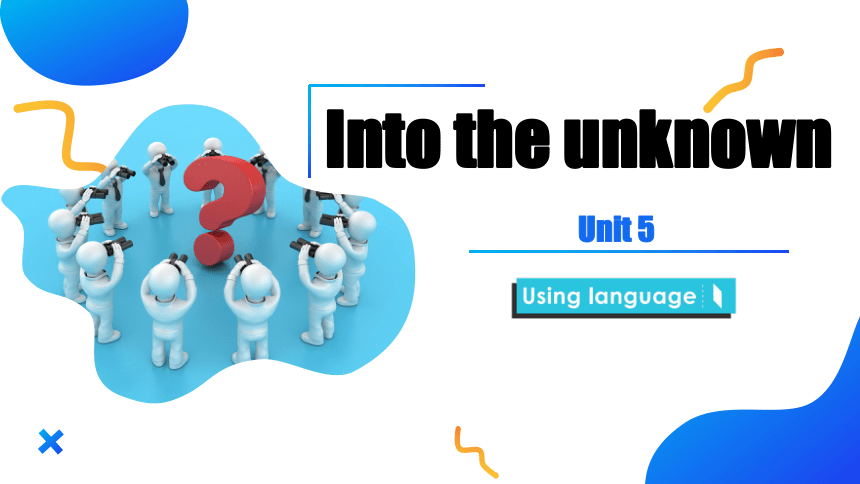 | |
| 格式 | pptx | ||
| 文件大小 | 42.4MB | ||
| 资源类型 | 教案 | ||
| 版本资源 | 外研版(2019) | ||
| 科目 | 英语 | ||
| 更新时间 | 2025-04-24 19:28:44 | ||
图片预览

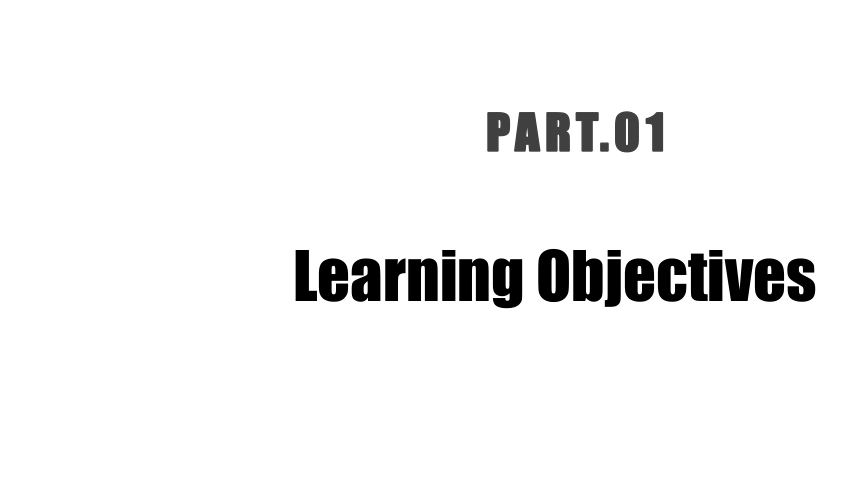
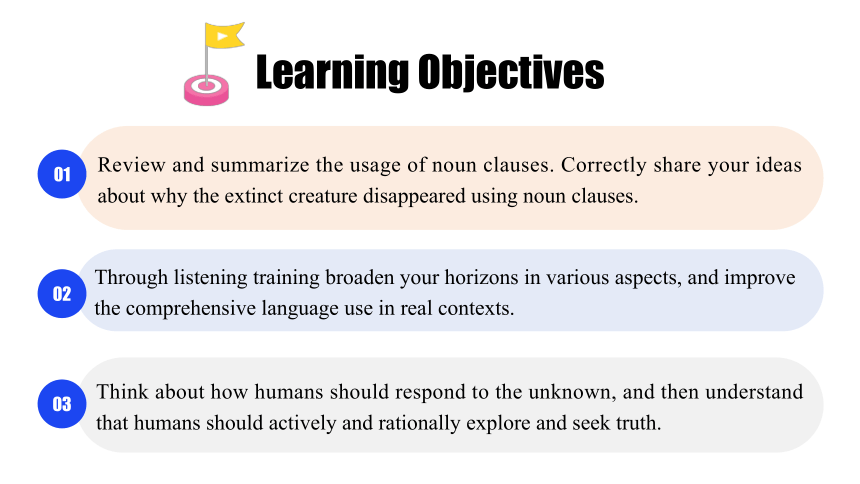
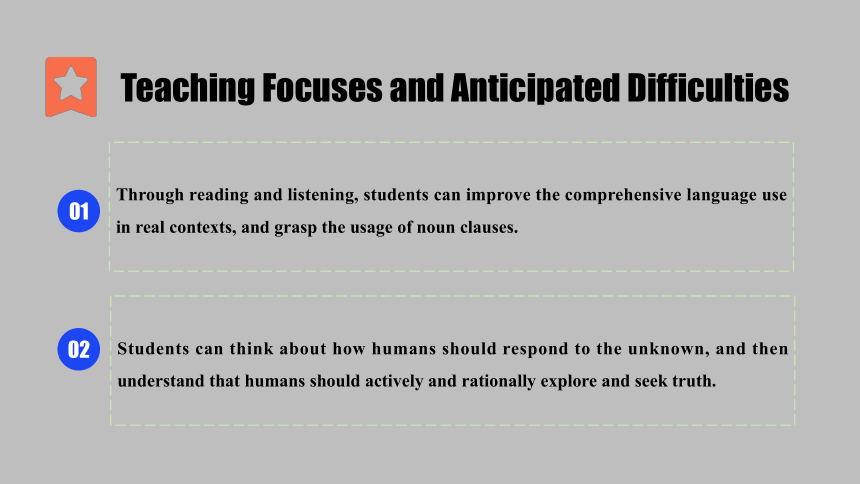
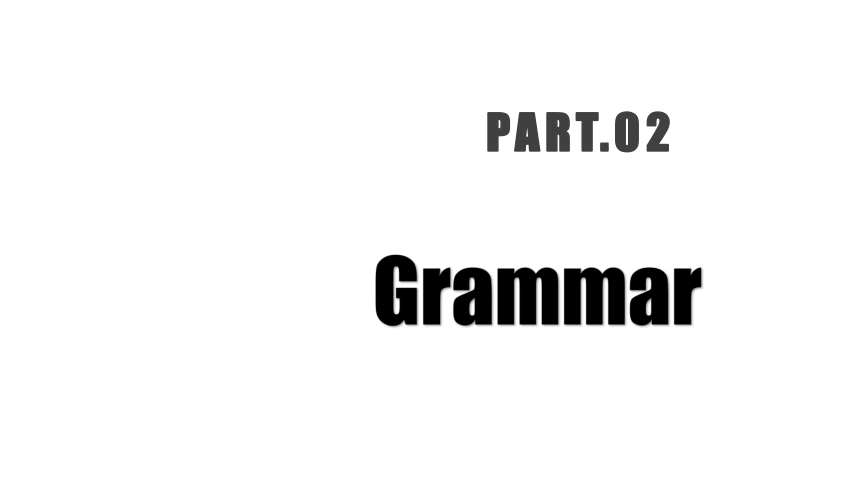
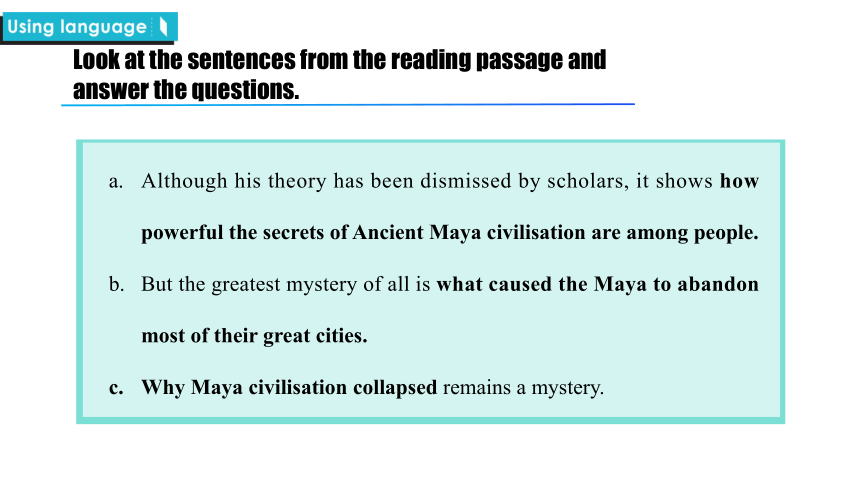
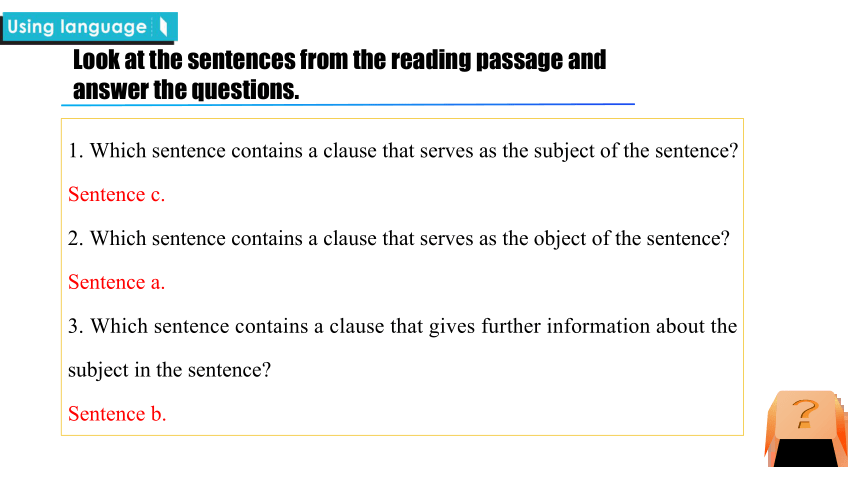
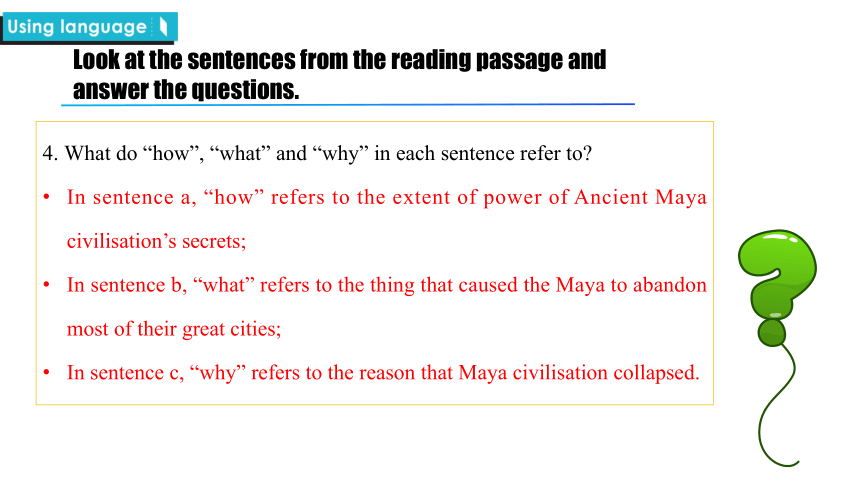
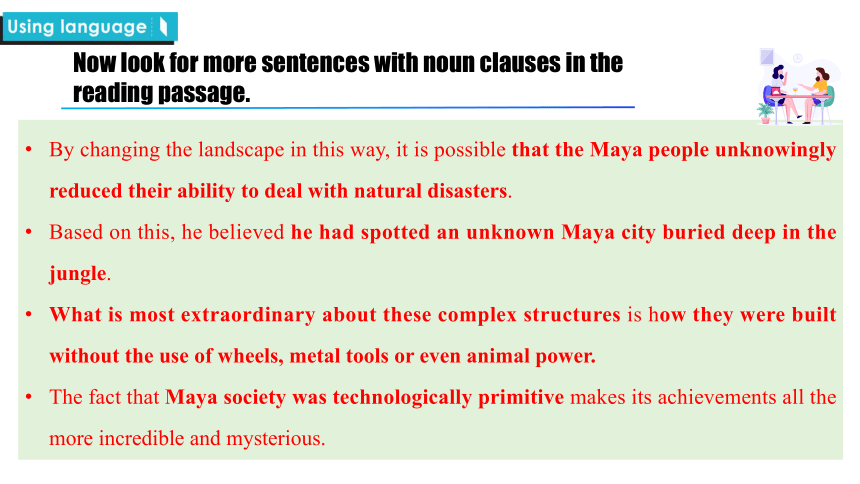
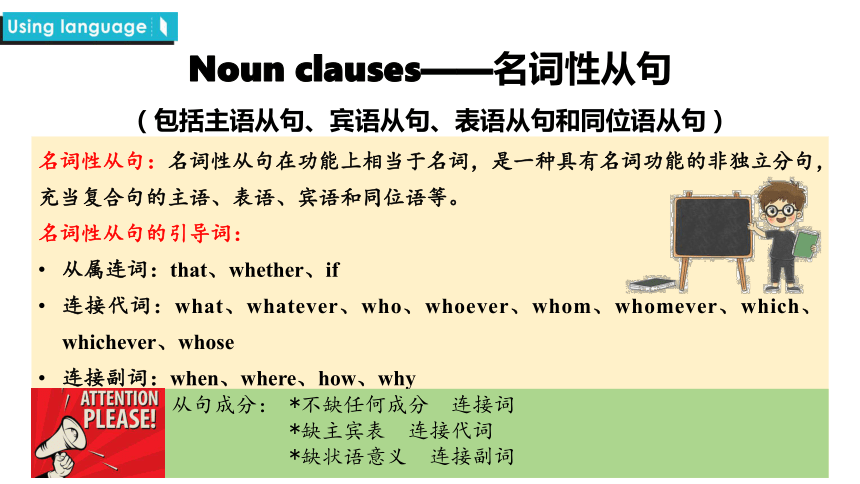
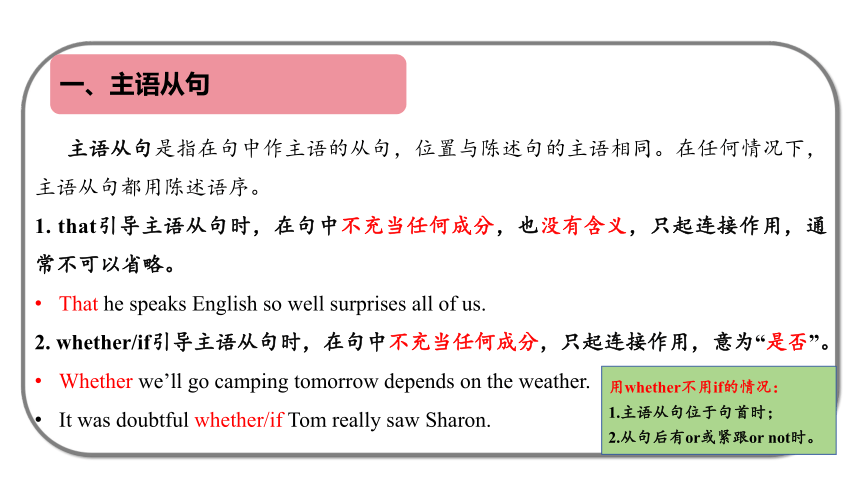

文档简介
(共51张PPT)
Unit 5
Into the unknown
PART.01
Learning Objectives
Review and summarize the usage of noun clauses. Correctly share your ideas about why the extinct creature disappeared using noun clauses.
01
Think about how humans should respond to the unknown, and then understand that humans should actively and rationally explore and seek truth.
03
Through listening training broaden your horizons in various aspects, and improve the comprehensive language use in real contexts.
02
Learning Objectives
Through reading and listening, students can improve the comprehensive language use in real contexts, and grasp the usage of noun clauses.
Students can think about how humans should respond to the unknown, and then understand that humans should actively and rationally explore and seek truth.
01
02
Teaching Focuses and Anticipated Difficulties
PART.02
Grammar
01
Look at the sentences from the reading passage and answer the questions.
Although his theory has been dismissed by scholars, it shows how powerful the secrets of Ancient Maya civilisation are among people.
But the greatest mystery of all is what caused the Maya to abandon most of their great cities.
Why Maya civilisation collapsed remains a mystery.
01
1. Which sentence contains a clause that serves as the subject of the sentence
Sentence c.
2. Which sentence contains a clause that serves as the object of the sentence
Sentence a.
3. Which sentence contains a clause that gives further information about the subject in the sentence
Sentence b.
Look at the sentences from the reading passage and answer the questions.
01
4. What do “how”, “what” and “why” in each sentence refer to
In sentence a, “how” refers to the extent of power of Ancient Maya civilisation’s secrets;
In sentence b, “what” refers to the thing that caused the Maya to abandon most of their great cities;
In sentence c, “why” refers to the reason that Maya civilisation collapsed.
Look at the sentences from the reading passage and answer the questions.
Now look for more sentences with noun clauses in the reading passage.
By changing the landscape in this way, it is possible that the Maya people unknowingly reduced their ability to deal with natural disasters.
Based on this, he believed he had spotted an unknown Maya city buried deep in the jungle.
What is most extraordinary about these complex structures is how they were built without the use of wheels, metal tools or even animal power.
The fact that Maya society was technologically primitive makes its achievements all the more incredible and mysterious.
Noun clauses——名词性从句
(包括主语从句、宾语从句、表语从句和同位语从句)
名词性从句:名词性从句在功能上相当于名词,是一种具有名词功能的非独立分句,充当复合句的主语、表语、宾语和同位语等。
名词性从句的引导词:
从属连词:that、whether、if
连接代词:what、whatever、who、whoever、whom、whomever、which、whichever、whose
连接副词:when、where、how、why
从句成分: *不缺任何成分 连接词
*缺主宾表 连接代词
*缺状语意义 连接副词
主语从句是指在句中作主语的从句,位置与陈述句的主语相同。在任何情况下,主语从句都用陈述语序。
1. that引导主语从句时,在句中不充当任何成分,也没有含义,只起连接作用,通常不可以省略。
That he speaks English so well surprises all of us.
2. whether/if引导主语从句时,在句中不充当任何成分,只起连接作用,意为“是否”。
Whether we’ll go camping tomorrow depends on the weather.
It was doubtful whether/if Tom really saw Sharon.
一、主语从句
用whether不用if的情况:
1.主语从句位于句首时;
2.从句后有or或紧跟or not时。
3. 连接代词what, whatever, which, whichever, who, whoever, whom, whomever, whose引导主语从句时,既起连接作用,又在从句中充当一定的句子成分,可作主语、宾语、表语和定语。
Which team will win the match is still unknown.
4. 连接副词when, where, how, why引导主语从句时,既起连接作用,又在从句中作状语。
Where the library is to be built has not been decided yet.
一、主语从句
5. it作形式主语的主语从句
①It+be+形容词+that从句
It is strange that he knows nothing about it.
②It+be +名词词组+that从句
It is a pity that he missed such a good chance.
③It+be +V-ed+that从句
It is said that he is the best student in the class.
④It+seem, happen, appear等不及物动词+that从句
It seems that Alice is not coming to the party at all.
一、主语从句
在句中充当宾语的从句叫作宾语从句。宾语从句在句中可以作及物动词、介词或一些形容词的宾语。
1. that引导宾语从句时,在句中不充当任何成分,也没有含义,通常可以省略。
Everyone knows (that) the earth is made up of matter.
但在下列情况中,that需保留:
a. 主、从句之间有表示时间等的状语时that不能省略,否则会产生歧义。
The geography teacher told us yesterday that the nearest neighbour of the earth is the moon.
b. 主、从句之间有插入语时不可省去that。
But I still remember, believe it or not, that we got lost on a rainy night.
c. 引导两个或两个以上的宾语从句时,第二个以及第二个以后的宾语从句中的连词that不能省略。
From what is written here I can see you had a very bad cold three years ago and that you also had a small operation last year.
二、宾语从句
2. whether/if引导宾语从句时,作“是否”讲,常放在动词(短语)ask, care, wonder, know和find out等后面。一般情况下,两者可以换用,口语中多用if。
Nobody knows whether/if it will rain tomorrow.
3. 连接代词what, whatever, which, whichever, who, whoever, whom, whomever, whose引导宾语从句时,既起连接作用,又在从句中充当一定的句子成分,可作主语、宾语等。
I can’t imagine what made him act like that.
二、宾语从句
4. 连接副词when, where, how, why引导宾语从句时,既起连接作用,又在从句中作状语。when在宾语从句中作时间状语;where在宾语从句中作地点状语;how在宾语从句中作方式状语;why在宾语从句中作原因状语。
Please tell me when we shall discuss our work plan.
5. 当宾语从句后有宾语补足语时,需要用it作形式宾语,而将宾语从句后置。
I made it clear that we were determined to carry out the plan.
二、宾语从句
1. 当主句主语是第一人称,且谓语为think, believe, suppose, expect等动词时,如果宾语从句表示否定意思,通常否定前移,即否定主句的谓语。
I don’t think there’s a computer store in the town.
I don’t believe that she’s ever been to Hong Kong.
2. 若主句是一般现在时或一般将来时,从句可根据需要选用合适的时态;若主句是过去时态,从句一般要用与过去时态相关的某种时态;若从句表达的是客观事实、真理、自然现象等,从句通常用一般现在时。
He said that light travels much faster than sound.
在句中充当表语的从句叫作表语从句。表语从句是对主句的主语进行解释、说明,出现在连系动词之后,一般结构为“主语+连系动词+表语从句”。
三、表语从句
状态类:be动词
持续类:keep, remain, stay, lie, stand, rest ...
表象类:seem, appear ...
感官类:look, smell, taste, sound, feel
变化类:become, get, turn, grow, fall, come, go ...
1. 当主语是reason且后面的表语从句表示原因时通常用that引导;而当it, this或that作主语,后面的表语从句常用because或why引导。because引导表语从句常用于“This/That/It is/was because ...”句型中。
My reason is that the cost will be too high.
I had to catch the first train. That / This / It was why I left so early.
That’s because she caught a bad cold yesterday.
三、表语从句
注意:That is because ... 强调原因;That is why ... 强调结果。
He was sent to the hospital. That’s because he was ill.(前果后因)
Bob had been to the place before. That was why he acted as a guide.(前因后果)
2. 表语从句还可由as if/as though引导。as if/as though引导表语从句时,主句中的动词可用be, seem, appear, look, taste, sound, feel等。
She looks as if / as though she had seen a ghost.
This meat tastes as if / as though it has already gone bad.
3. 如果引出表语从句的名词是一些表示 “建议”或者“命令”之类的词如advice, suggestion, proposal, order, plan, idea等, 那么从句中的动词通常用(should)+动词原形。
My suggestion is that we all should (take) an active part in the coming sports meet.
三、表语从句
在句中充当同位语的从句叫作同位语从句。同位语从句用以解释、说明某一名词的内容或实质。
1. 同位语从句通常由that引导, 但whether, who, where等有时也可引导同位语从句。
Tears filled her eyes at the thought that she might never see him.
I have no idea whether I should buy a car or not.
The question who goes abroad on this business tour requires consideration.
四、同位语从句
2. 可接同位语从句的通常是一些表示抽象意义的名词,常见的有news, idea, fact, belief, message, conclusion, decision, doubt, hope, chance, thought等。
We were very excited at the news that our Chinese athletes won many gold medals.
The fact that the agreement was signed was important.
3. 同位语从句有时不直接跟在它所解释说明的名词后面,而是被其它成分隔开。
The question came up at the meeting whether we had enough money for our research.
四、同位语从句
1. 同位语从句是名词性从句,是用来进一步解释或补充说明前面的名词,它与被修饰词语通常可以划等号;而定语从句是形容词性的,是对一个名词加以修饰和限定。
We are glad at the news that he will come. (同位语从句)
We are glad at the news that he told us.(定语从句)
2. 同位语从句常由连接词that引导,虽然that在从句中不充当任何成分,但不可省略。而定语从句由关系代词that引导,that代替先行词,并在从句中充当成分(主语或宾语), 充当宾语时常可省略。what, how, whether可引导同位语从句,但不引导定语从句。
The proposal that he put forward is to be discussed at the meeting.(定语从句)
The proposal that we should import more equipment from abroad is to be discussed at the meeting.(同位语从句)
同位语从句与定语从句的区别:
There are many mysteries about dinosaurs to which we long to find explanations. You may think that dinosaurs were big, green and scaly, right In fact, it seems that they appeared very different form 1 ____________ (think).
In recent years, scientists have worked out 2 _________________________________(look): many of them were small with feathers. However, 3 _______________ (have) feathers still isn’t clear — it might have been for communicating or for staying warm, but not just for flight.
Scientists also believe that many dinosaurs had bright colours. It seems 4 _______________ (depend on) their habitats. That is, dinosaurs which could fly would have had different colours to those living in the sea.
Complete the passage using noun clauses with words in brackets.
02
What did DINOSAURS look like
what we think
what they looked like/ how they looked
whether they had
that depended on
Talk about what caused the disappearance of dinosaurs using noun clauses where appropriate. You may use the notes to help you.
03
Among the many unsolved mysteries about dinosaurs, what really interests me is their disappearance. One possible explanation is that …
Among the many unsolved mysteries about dinosaurs, what really interests me is their disappearance. One possible explanation is that there was a huge meteorite hitting Earth. But what I believed most was ash and gas from erupting volcanoes. Where so much magma went, all the living things including dinosaurs lost their lives. Besides, it is a fact that clouds of fire and smoke blocked the whole sky so that they had no sunshine to enjoy and no oxygen to take in.
Watch a video.
Work in pairs. Do research into another extinct creature. Share your ideas about why it disappeared using noun clauses where appropriate.
04
Read the passage and answer the questions. Pay attention to the words and expressions in bold.
05
When something strange or unfamiliar happens, the flight instinct can kick in. Often, making a quick getaway is a sensible and understandable natural response, dating back to a time when our ancestors were running for their lives from dangers, such as wild animals, lightning and fire. So while you may be tempted to check out a strange object or to test the waters of a new situation, it can be safer to steer clear of the unfamiliar.
However, not everyone chooses to follow this instinct. Instead of retreating to their caves, some of our ancestors chose to subdue their fears and pursue the unknown - and this curiosity led them to, for instance, discover the use of fire.
In more recent times, Norwegian explorer, Roald Amundsen endured one of the most hostile environments on Earth when he set out into uncharted territory to reach the South Pole - a region of the planet ripe for exploration.
These reactions help humankind delve into the unknown and advance towards a more progressive and civilised society. Of course, exploration doesn’t have to mean blindly throwing ourselves into the unknown, and it’s never wrong to think twice before taking action. While there is no need for us to shrink from new situations, we should always look into things first and consider our options.
Read the passage and answer the questions. Pay attention to the words and expressions in bold.
05
1. What is the flight instinct Why do some people react that way in the face of the unknown
Flight instinct is our instinctive reaction to get away from a strange, unfamiliar or dangerous situation.
Some people react that way in the face of the unknown because it is a sensible and understandable natural response.
2. What other reactions could people have when facing the unknown
Some people choose to overcome their fears and face the unknown.
Put the words and expressions in Activity 5 into the table. Add any more you can think of.
06
Avoiding Exploring Overcoming Hesitating
making a quick getaway
running for their lives from
steer clear of
retreating to
shrink from
check out
test the waters of
set out into
delve into
taking action
subdue
endured
think twice
look into
consider our options
1. check out
check in (在旅馆、机场等)登记,报到
check up 核对;检验
pay by check 用支票付款
make/have a check (of) 核对
练习:
Don’t forget to check _______ at the front desk when you reach the resort.
Parents should regularly check ________ on their children’s online activities to ensure their safety.
in
up
2. set out
set out to do sth.=set about doing sth. 着手做某事
set off 动身,出发;使爆炸
set down 记下,写下,放下
set aside 把……放到一旁;留出(钱或时间)
set up 建立,创建;设立,设置
练习:
We need to set about ________ (find) a way to deal with the problem.
They set _____ a new company last year, aiming to revolutionize the e-commerce industry.
finding
up
3. throw oneself into
throw away 抛弃;扔掉
throw off 脱去
throw out 抛出;扔出去
throw oneself on 扑倒在……上;完全依赖
练习:
A lot of young people throw themselves ______ the voluntary work in hospitals actively.
Don’t throw ________ those old books; you can donate them to the local library.
into
away
4. look into
look down upon/on 看不起,轻视
look forward to 盼望;期望
look through 快速查看;浏览
look up 往上看;查阅
look up to 尊敬,敬仰
练习:
I’m looking forward to ________ (hear) the good news.
Before buying a book, I always like to look _________ its contents and reviews.
through
hearing
5. investigation
conduct/carry out an investigation 开展调查
under investigation 在调查研究中
investigation into 对……的调查
investigate v. 调查;研究
练习:
The environmental protection agency is conducting an ____________(investigate) into the source of the river pollution.
investigation
PART.03
Listening
Read the passage and answer the questions.
07
Of all the workings of the human body, there is one organ that produces the most intrigue amongst scientists. The brain is the centre of the nervous system and controls most of the body’s activities. Interestingly, it is the back part of the brain that is involved with our vision. The sides of the brain are involved in memory, speech and rhythm. Although the brain amounts to only about 2% of total body weight, it uses up to 20% of the body’s energy – more than any other organ. Scientists have been conducting research in order to seek greater understanding of the brain, especially since the 1950s. Nevertheless, there is still a long way to go before we can completely understand the workings of this complex organ.
Read the passage and answer the questions.
07
1. What functions of the brain are mentioned in the passage
The brain functions mentioned include its being the centre of the nervous system and controlling most of the body’s activities, including vision, memory, speech and rhythm.
2. What is the current research situation concerning the brain
There is still a long way to go before we can completely understand the workings of the brain.
3. Do you know any other interesting facts about the brain Share them with the class.
Listen to the interview and choose the topic discussed.
08
Methods to keep the brain healthy and active.
Sleep-related mysteries.
Ways of improving sleep quality.
Methods of interpreting dreams.
Listen again and complete the table.
09
Theories Dr Long’s comments
The brain needs time to 1______________________. Recent students prove that our brains 2 ______________ during sleep.
The brain 3 ________________________________ when we’re awake. It needs sleep to 4 ____________________. There isn’t 5 _____________ to confirm this. It might not be 6 _______________________ for sleep.
7 ___________________________________________ in the brain while we’re awake, and the brain reflects on them and 8 _________________________ in our dreams. A lot of research has been conducted, but we still can’t prove that 9 ____________________________________.
Other unanswered questions Why do we “see” our dreams 10 ________________________________________________________________. rest and do maintenance
makes lots of poisonous chemicals
remove these chemicals
New connections are formed between different parts
use them to form new memories
remain active
enough data
the most important reason
sleep is necessary to this function
Why do some people dream in colour and other don’t
Now use the information in the table to give a lecture to the class. Do further research if necessary.
Complete the boxes with the expressions from the interview.
10
Could you tell us something about ...
It’s because ...
... prove that ...
What other reasons could there be for it
Would you tell us more about ...
Could you tell us something about ...
What other reasons could there be for it
Would you tell us more about ...
It’s because ...
... prove that ...
Asking for more information
Explaining
Work in groups. Talk about the investigations into another scientific mystery using the words and expressions in this section. Do further research if necessary.
11
Now talk about how effectively you and your group have used the words and expressions you have learnt in this section and suggest ways to improve.
PART.04
Exercise
Exercise
1. The journalist’s i______________(调查) into environmental pollution led to significant public attention and policy changes.
2. The thieves made their g_________(逃跑) in a stolen car, speeding through the narrow streets to evade the police.
3. Facing mounting losses in the overseas market, the company decided to r________(离开) from several unprofitable regions.
nvestigation
etaway
etreat
Exercise 用所给短语的适当形式填空
1. She never _______________ a challenge and always approaches difficult tasks with determination.
2. He stopped to _____________ a strange noise coming from the engine of his car.
3. Before investing all your savings in that risky business, you should ______________.
4. Once he discovered a passion for painting, he __________________ learning different techniques.
5. We ______________ early in the morning, hoping to reach the mountaintop before noon.
6. The company has appointed a special committee to ____________ the recent production issues.
check out, set out, shrink from, look into, throw oneself into, think twice
shrinks from
check out
think twice
threw himself into
set out
look into
PART.05
Summary
Using language
Grammar
Vocabulary
Listening
名词性从句
主语从句
表语从句
宾语从句
同位语从句
PART.06
Homework
Homework
1. Review the usage of noun clauses and do the relevant exercises;
2. Write a passage about why dinosaurs disappeared using noun clauses.
See you next class!
Unit 5
Into the unknown
PART.01
Learning Objectives
Review and summarize the usage of noun clauses. Correctly share your ideas about why the extinct creature disappeared using noun clauses.
01
Think about how humans should respond to the unknown, and then understand that humans should actively and rationally explore and seek truth.
03
Through listening training broaden your horizons in various aspects, and improve the comprehensive language use in real contexts.
02
Learning Objectives
Through reading and listening, students can improve the comprehensive language use in real contexts, and grasp the usage of noun clauses.
Students can think about how humans should respond to the unknown, and then understand that humans should actively and rationally explore and seek truth.
01
02
Teaching Focuses and Anticipated Difficulties
PART.02
Grammar
01
Look at the sentences from the reading passage and answer the questions.
Although his theory has been dismissed by scholars, it shows how powerful the secrets of Ancient Maya civilisation are among people.
But the greatest mystery of all is what caused the Maya to abandon most of their great cities.
Why Maya civilisation collapsed remains a mystery.
01
1. Which sentence contains a clause that serves as the subject of the sentence
Sentence c.
2. Which sentence contains a clause that serves as the object of the sentence
Sentence a.
3. Which sentence contains a clause that gives further information about the subject in the sentence
Sentence b.
Look at the sentences from the reading passage and answer the questions.
01
4. What do “how”, “what” and “why” in each sentence refer to
In sentence a, “how” refers to the extent of power of Ancient Maya civilisation’s secrets;
In sentence b, “what” refers to the thing that caused the Maya to abandon most of their great cities;
In sentence c, “why” refers to the reason that Maya civilisation collapsed.
Look at the sentences from the reading passage and answer the questions.
Now look for more sentences with noun clauses in the reading passage.
By changing the landscape in this way, it is possible that the Maya people unknowingly reduced their ability to deal with natural disasters.
Based on this, he believed he had spotted an unknown Maya city buried deep in the jungle.
What is most extraordinary about these complex structures is how they were built without the use of wheels, metal tools or even animal power.
The fact that Maya society was technologically primitive makes its achievements all the more incredible and mysterious.
Noun clauses——名词性从句
(包括主语从句、宾语从句、表语从句和同位语从句)
名词性从句:名词性从句在功能上相当于名词,是一种具有名词功能的非独立分句,充当复合句的主语、表语、宾语和同位语等。
名词性从句的引导词:
从属连词:that、whether、if
连接代词:what、whatever、who、whoever、whom、whomever、which、whichever、whose
连接副词:when、where、how、why
从句成分: *不缺任何成分 连接词
*缺主宾表 连接代词
*缺状语意义 连接副词
主语从句是指在句中作主语的从句,位置与陈述句的主语相同。在任何情况下,主语从句都用陈述语序。
1. that引导主语从句时,在句中不充当任何成分,也没有含义,只起连接作用,通常不可以省略。
That he speaks English so well surprises all of us.
2. whether/if引导主语从句时,在句中不充当任何成分,只起连接作用,意为“是否”。
Whether we’ll go camping tomorrow depends on the weather.
It was doubtful whether/if Tom really saw Sharon.
一、主语从句
用whether不用if的情况:
1.主语从句位于句首时;
2.从句后有or或紧跟or not时。
3. 连接代词what, whatever, which, whichever, who, whoever, whom, whomever, whose引导主语从句时,既起连接作用,又在从句中充当一定的句子成分,可作主语、宾语、表语和定语。
Which team will win the match is still unknown.
4. 连接副词when, where, how, why引导主语从句时,既起连接作用,又在从句中作状语。
Where the library is to be built has not been decided yet.
一、主语从句
5. it作形式主语的主语从句
①It+be+形容词+that从句
It is strange that he knows nothing about it.
②It+be +名词词组+that从句
It is a pity that he missed such a good chance.
③It+be +V-ed+that从句
It is said that he is the best student in the class.
④It+seem, happen, appear等不及物动词+that从句
It seems that Alice is not coming to the party at all.
一、主语从句
在句中充当宾语的从句叫作宾语从句。宾语从句在句中可以作及物动词、介词或一些形容词的宾语。
1. that引导宾语从句时,在句中不充当任何成分,也没有含义,通常可以省略。
Everyone knows (that) the earth is made up of matter.
但在下列情况中,that需保留:
a. 主、从句之间有表示时间等的状语时that不能省略,否则会产生歧义。
The geography teacher told us yesterday that the nearest neighbour of the earth is the moon.
b. 主、从句之间有插入语时不可省去that。
But I still remember, believe it or not, that we got lost on a rainy night.
c. 引导两个或两个以上的宾语从句时,第二个以及第二个以后的宾语从句中的连词that不能省略。
From what is written here I can see you had a very bad cold three years ago and that you also had a small operation last year.
二、宾语从句
2. whether/if引导宾语从句时,作“是否”讲,常放在动词(短语)ask, care, wonder, know和find out等后面。一般情况下,两者可以换用,口语中多用if。
Nobody knows whether/if it will rain tomorrow.
3. 连接代词what, whatever, which, whichever, who, whoever, whom, whomever, whose引导宾语从句时,既起连接作用,又在从句中充当一定的句子成分,可作主语、宾语等。
I can’t imagine what made him act like that.
二、宾语从句
4. 连接副词when, where, how, why引导宾语从句时,既起连接作用,又在从句中作状语。when在宾语从句中作时间状语;where在宾语从句中作地点状语;how在宾语从句中作方式状语;why在宾语从句中作原因状语。
Please tell me when we shall discuss our work plan.
5. 当宾语从句后有宾语补足语时,需要用it作形式宾语,而将宾语从句后置。
I made it clear that we were determined to carry out the plan.
二、宾语从句
1. 当主句主语是第一人称,且谓语为think, believe, suppose, expect等动词时,如果宾语从句表示否定意思,通常否定前移,即否定主句的谓语。
I don’t think there’s a computer store in the town.
I don’t believe that she’s ever been to Hong Kong.
2. 若主句是一般现在时或一般将来时,从句可根据需要选用合适的时态;若主句是过去时态,从句一般要用与过去时态相关的某种时态;若从句表达的是客观事实、真理、自然现象等,从句通常用一般现在时。
He said that light travels much faster than sound.
在句中充当表语的从句叫作表语从句。表语从句是对主句的主语进行解释、说明,出现在连系动词之后,一般结构为“主语+连系动词+表语从句”。
三、表语从句
状态类:be动词
持续类:keep, remain, stay, lie, stand, rest ...
表象类:seem, appear ...
感官类:look, smell, taste, sound, feel
变化类:become, get, turn, grow, fall, come, go ...
1. 当主语是reason且后面的表语从句表示原因时通常用that引导;而当it, this或that作主语,后面的表语从句常用because或why引导。because引导表语从句常用于“This/That/It is/was because ...”句型中。
My reason is that the cost will be too high.
I had to catch the first train. That / This / It was why I left so early.
That’s because she caught a bad cold yesterday.
三、表语从句
注意:That is because ... 强调原因;That is why ... 强调结果。
He was sent to the hospital. That’s because he was ill.(前果后因)
Bob had been to the place before. That was why he acted as a guide.(前因后果)
2. 表语从句还可由as if/as though引导。as if/as though引导表语从句时,主句中的动词可用be, seem, appear, look, taste, sound, feel等。
She looks as if / as though she had seen a ghost.
This meat tastes as if / as though it has already gone bad.
3. 如果引出表语从句的名词是一些表示 “建议”或者“命令”之类的词如advice, suggestion, proposal, order, plan, idea等, 那么从句中的动词通常用(should)+动词原形。
My suggestion is that we all should (take) an active part in the coming sports meet.
三、表语从句
在句中充当同位语的从句叫作同位语从句。同位语从句用以解释、说明某一名词的内容或实质。
1. 同位语从句通常由that引导, 但whether, who, where等有时也可引导同位语从句。
Tears filled her eyes at the thought that she might never see him.
I have no idea whether I should buy a car or not.
The question who goes abroad on this business tour requires consideration.
四、同位语从句
2. 可接同位语从句的通常是一些表示抽象意义的名词,常见的有news, idea, fact, belief, message, conclusion, decision, doubt, hope, chance, thought等。
We were very excited at the news that our Chinese athletes won many gold medals.
The fact that the agreement was signed was important.
3. 同位语从句有时不直接跟在它所解释说明的名词后面,而是被其它成分隔开。
The question came up at the meeting whether we had enough money for our research.
四、同位语从句
1. 同位语从句是名词性从句,是用来进一步解释或补充说明前面的名词,它与被修饰词语通常可以划等号;而定语从句是形容词性的,是对一个名词加以修饰和限定。
We are glad at the news that he will come. (同位语从句)
We are glad at the news that he told us.(定语从句)
2. 同位语从句常由连接词that引导,虽然that在从句中不充当任何成分,但不可省略。而定语从句由关系代词that引导,that代替先行词,并在从句中充当成分(主语或宾语), 充当宾语时常可省略。what, how, whether可引导同位语从句,但不引导定语从句。
The proposal that he put forward is to be discussed at the meeting.(定语从句)
The proposal that we should import more equipment from abroad is to be discussed at the meeting.(同位语从句)
同位语从句与定语从句的区别:
There are many mysteries about dinosaurs to which we long to find explanations. You may think that dinosaurs were big, green and scaly, right In fact, it seems that they appeared very different form 1 ____________ (think).
In recent years, scientists have worked out 2 _________________________________(look): many of them were small with feathers. However, 3 _______________ (have) feathers still isn’t clear — it might have been for communicating or for staying warm, but not just for flight.
Scientists also believe that many dinosaurs had bright colours. It seems 4 _______________ (depend on) their habitats. That is, dinosaurs which could fly would have had different colours to those living in the sea.
Complete the passage using noun clauses with words in brackets.
02
What did DINOSAURS look like
what we think
what they looked like/ how they looked
whether they had
that depended on
Talk about what caused the disappearance of dinosaurs using noun clauses where appropriate. You may use the notes to help you.
03
Among the many unsolved mysteries about dinosaurs, what really interests me is their disappearance. One possible explanation is that …
Among the many unsolved mysteries about dinosaurs, what really interests me is their disappearance. One possible explanation is that there was a huge meteorite hitting Earth. But what I believed most was ash and gas from erupting volcanoes. Where so much magma went, all the living things including dinosaurs lost their lives. Besides, it is a fact that clouds of fire and smoke blocked the whole sky so that they had no sunshine to enjoy and no oxygen to take in.
Watch a video.
Work in pairs. Do research into another extinct creature. Share your ideas about why it disappeared using noun clauses where appropriate.
04
Read the passage and answer the questions. Pay attention to the words and expressions in bold.
05
When something strange or unfamiliar happens, the flight instinct can kick in. Often, making a quick getaway is a sensible and understandable natural response, dating back to a time when our ancestors were running for their lives from dangers, such as wild animals, lightning and fire. So while you may be tempted to check out a strange object or to test the waters of a new situation, it can be safer to steer clear of the unfamiliar.
However, not everyone chooses to follow this instinct. Instead of retreating to their caves, some of our ancestors chose to subdue their fears and pursue the unknown - and this curiosity led them to, for instance, discover the use of fire.
In more recent times, Norwegian explorer, Roald Amundsen endured one of the most hostile environments on Earth when he set out into uncharted territory to reach the South Pole - a region of the planet ripe for exploration.
These reactions help humankind delve into the unknown and advance towards a more progressive and civilised society. Of course, exploration doesn’t have to mean blindly throwing ourselves into the unknown, and it’s never wrong to think twice before taking action. While there is no need for us to shrink from new situations, we should always look into things first and consider our options.
Read the passage and answer the questions. Pay attention to the words and expressions in bold.
05
1. What is the flight instinct Why do some people react that way in the face of the unknown
Flight instinct is our instinctive reaction to get away from a strange, unfamiliar or dangerous situation.
Some people react that way in the face of the unknown because it is a sensible and understandable natural response.
2. What other reactions could people have when facing the unknown
Some people choose to overcome their fears and face the unknown.
Put the words and expressions in Activity 5 into the table. Add any more you can think of.
06
Avoiding Exploring Overcoming Hesitating
making a quick getaway
running for their lives from
steer clear of
retreating to
shrink from
check out
test the waters of
set out into
delve into
taking action
subdue
endured
think twice
look into
consider our options
1. check out
check in (在旅馆、机场等)登记,报到
check up 核对;检验
pay by check 用支票付款
make/have a check (of) 核对
练习:
Don’t forget to check _______ at the front desk when you reach the resort.
Parents should regularly check ________ on their children’s online activities to ensure their safety.
in
up
2. set out
set out to do sth.=set about doing sth. 着手做某事
set off 动身,出发;使爆炸
set down 记下,写下,放下
set aside 把……放到一旁;留出(钱或时间)
set up 建立,创建;设立,设置
练习:
We need to set about ________ (find) a way to deal with the problem.
They set _____ a new company last year, aiming to revolutionize the e-commerce industry.
finding
up
3. throw oneself into
throw away 抛弃;扔掉
throw off 脱去
throw out 抛出;扔出去
throw oneself on 扑倒在……上;完全依赖
练习:
A lot of young people throw themselves ______ the voluntary work in hospitals actively.
Don’t throw ________ those old books; you can donate them to the local library.
into
away
4. look into
look down upon/on 看不起,轻视
look forward to 盼望;期望
look through 快速查看;浏览
look up 往上看;查阅
look up to 尊敬,敬仰
练习:
I’m looking forward to ________ (hear) the good news.
Before buying a book, I always like to look _________ its contents and reviews.
through
hearing
5. investigation
conduct/carry out an investigation 开展调查
under investigation 在调查研究中
investigation into 对……的调查
investigate v. 调查;研究
练习:
The environmental protection agency is conducting an ____________(investigate) into the source of the river pollution.
investigation
PART.03
Listening
Read the passage and answer the questions.
07
Of all the workings of the human body, there is one organ that produces the most intrigue amongst scientists. The brain is the centre of the nervous system and controls most of the body’s activities. Interestingly, it is the back part of the brain that is involved with our vision. The sides of the brain are involved in memory, speech and rhythm. Although the brain amounts to only about 2% of total body weight, it uses up to 20% of the body’s energy – more than any other organ. Scientists have been conducting research in order to seek greater understanding of the brain, especially since the 1950s. Nevertheless, there is still a long way to go before we can completely understand the workings of this complex organ.
Read the passage and answer the questions.
07
1. What functions of the brain are mentioned in the passage
The brain functions mentioned include its being the centre of the nervous system and controlling most of the body’s activities, including vision, memory, speech and rhythm.
2. What is the current research situation concerning the brain
There is still a long way to go before we can completely understand the workings of the brain.
3. Do you know any other interesting facts about the brain Share them with the class.
Listen to the interview and choose the topic discussed.
08
Methods to keep the brain healthy and active.
Sleep-related mysteries.
Ways of improving sleep quality.
Methods of interpreting dreams.
Listen again and complete the table.
09
Theories Dr Long’s comments
The brain needs time to 1______________________. Recent students prove that our brains 2 ______________ during sleep.
The brain 3 ________________________________ when we’re awake. It needs sleep to 4 ____________________. There isn’t 5 _____________ to confirm this. It might not be 6 _______________________ for sleep.
7 ___________________________________________ in the brain while we’re awake, and the brain reflects on them and 8 _________________________ in our dreams. A lot of research has been conducted, but we still can’t prove that 9 ____________________________________.
Other unanswered questions Why do we “see” our dreams 10 ________________________________________________________________. rest and do maintenance
makes lots of poisonous chemicals
remove these chemicals
New connections are formed between different parts
use them to form new memories
remain active
enough data
the most important reason
sleep is necessary to this function
Why do some people dream in colour and other don’t
Now use the information in the table to give a lecture to the class. Do further research if necessary.
Complete the boxes with the expressions from the interview.
10
Could you tell us something about ...
It’s because ...
... prove that ...
What other reasons could there be for it
Would you tell us more about ...
Could you tell us something about ...
What other reasons could there be for it
Would you tell us more about ...
It’s because ...
... prove that ...
Asking for more information
Explaining
Work in groups. Talk about the investigations into another scientific mystery using the words and expressions in this section. Do further research if necessary.
11
Now talk about how effectively you and your group have used the words and expressions you have learnt in this section and suggest ways to improve.
PART.04
Exercise
Exercise
1. The journalist’s i______________(调查) into environmental pollution led to significant public attention and policy changes.
2. The thieves made their g_________(逃跑) in a stolen car, speeding through the narrow streets to evade the police.
3. Facing mounting losses in the overseas market, the company decided to r________(离开) from several unprofitable regions.
nvestigation
etaway
etreat
Exercise 用所给短语的适当形式填空
1. She never _______________ a challenge and always approaches difficult tasks with determination.
2. He stopped to _____________ a strange noise coming from the engine of his car.
3. Before investing all your savings in that risky business, you should ______________.
4. Once he discovered a passion for painting, he __________________ learning different techniques.
5. We ______________ early in the morning, hoping to reach the mountaintop before noon.
6. The company has appointed a special committee to ____________ the recent production issues.
check out, set out, shrink from, look into, throw oneself into, think twice
shrinks from
check out
think twice
threw himself into
set out
look into
PART.05
Summary
Using language
Grammar
Vocabulary
Listening
名词性从句
主语从句
表语从句
宾语从句
同位语从句
PART.06
Homework
Homework
1. Review the usage of noun clauses and do the relevant exercises;
2. Write a passage about why dinosaurs disappeared using noun clauses.
See you next class!
